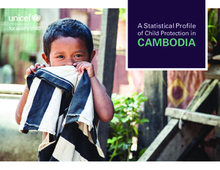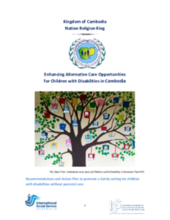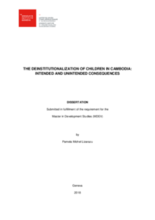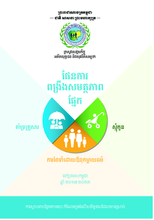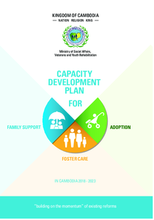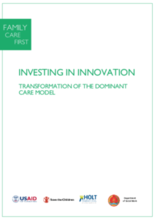This country page features an interactive, icon-based data dashboard providing a national-level overview of the status of children’s care and care reform efforts (a “Country Care Snapshot”), along with a list of resources and organizations in the country.
demographic_data
childrens_living_arrangement
children_living_without_bio
social_work_force
key_stakeholders
Key Stakeholders
Add New DataOther Relevant Reforms
Add New Datadrivers_of_institutionalisation
Drivers of Institutionaliziation
Add New Datakey_research_and_information
Key Data Sources
Add New DataMapping of residential care facilities in the capital and 24 provinces of the kingdom of Cambodia
National estimation of children in residential care institutions in Cambodia: A modelling study
Prevalence and number of children living in institutional care: global, regional, and country estimates
Shaping the national social protection strategy in Cambodia: Global influence and national ownership
Towards a Social Protection Strategy for the Poor and Vulnerable: Outcomes of the consultation process
Country Care Profile: Cambodia
Acknowledgements
Data for this country care snapshot was contributed by partners at Family Care First and UNICEF Cambodia.
Displaying 131 - 140 of 285
This report, the first of its kind in Cambodia, brings together the dispersed data into a comprehensive profile of child protection in the country.
According to this article from Cambodia's Khmer Times, "about 30 percent of the children living in orphanages around the country will be moved to live in communities with their mothers or fathers, a minister said last week after his ministry had investigated the situation."
This report marks a critical step in compiling comparable data and information about children in out-of-home care in Asia, defining our understanding of the continuum of care options available and metaphors to identify the gaps, challenges, strengths and opportunities within the child care systems in 10 identified Asian countries.
This report presents a needs assessment which provides a summary of the situation of children with disabilities who are living in residential care institutions and in communities in Cambodia and proposes seven key recommendations and relevant concrete actions for the short, medium and long term to improve the quality of care of children with disabilities living in institutions and to ensure that they have better access to basic services and are living in a protective environment.
This research aims to shed light on the perceived intended and unintended consequences of the deinstitutionalization process in Cambodia.
This Plan presents key findings and 23 recommendations, sub-divided into short-term, medium-term and long-term actions, for an effective and efficient implementation of foster care, adoption and family support in Cambodia.
This Plan presents key findings and 23 recommendations, sub-divided into short-term, medium-term and long-term actions, for an effective and efficient implementation of foster care, adoption and family support in Cambodia.
This study and documentation of existing reintegration and alternative family care services in Cambodia was designed to build the capacity of existing service providers to take emerging good practice to scale as an increased number of residential care institutions transition.
Family Care First (FCF) supported the study and documentation of existing reintegration and alternative family care services provided by seven implementing partners in Cambodia. This brief includes an outline of key findings of the study and concludes with recommendations based on those findings.
This Action Plan to prevent and respond to violence against children in Cambodia identifies five key areas of intervention: 1) coordination and cooperation, 2) primary prevention, 3) multi-sectoral child protection response services, 4) law and policy formulation and amendment, 5) monitoring and evaluation.

